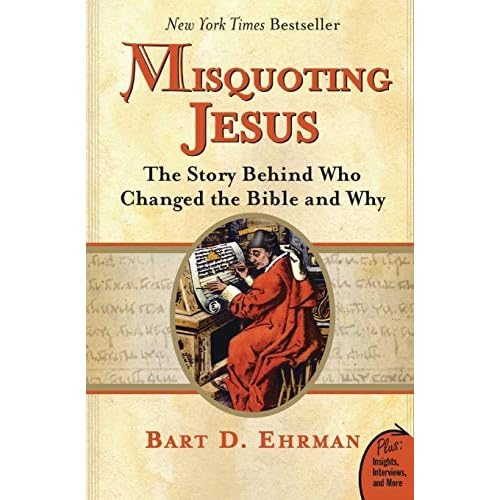 A friend of mine recommended this book and I've just finished reading it. I think there are a number of people out there who might be interested in it for a variety of reasons.
A friend of mine recommended this book and I've just finished reading it. I think there are a number of people out there who might be interested in it for a variety of reasons.Ehrman is a much-published expert on the Bible. He started reading it closely, in English, when he was a teenager and was born again. His religious teachers were extreme literalists in their interpretation of Scripture and adopting that view he undertook a long quest to find out what the authentic words of the Bible said. He eventually ended up as a master of ancient languages and an expert in text criticism (the systematic interpretation of the text).
Ehrman no longer is a Biblical literalist and in this book he explains why: there's too much evidence that the text of the Bible (specifically the New Testament) comes out of an evolving human tradition, in which scribes copied texts, made mistakes, and made other changes to discourage current incorrect ideas or to promote the truth that all good people knew but wasn't exactly nailed down in the existing text. Ehrman writes in part to show that we don't have the original texts of the books of the NT, nor copies of those texts, nor copies of the copies. We've got a number of versions created by human effort.
This is not a new idea. It's been around for hundreds of years and the imperfections of the text are acknowledged by all experts who aren't literalists. (Pick up a modern Bible and look at the footnoted variations.) Of course, there are a fair number of people who have never thought about this, and Misquoting Jesus is a pretty clear discussion of the state of the question.
Even if you don't care much about the text of the NT, you may be interested in the book. Ehrman the text critic says that he's unaware of any discussion aimed at ordinary people of how critics recover ancient texts from the diverse evidence of the manuscripts. I can't think of one, either. And it's really quite an important discipline. After all, we don't have the original manuscripts of Aristotle, either. (Interestingly, we do have some of Thomas Aquinas' 13th-century writings in his own hand. It's hard to read.)
So if you've ever wondered about how we know what various ancient writers said, this may interest you.
Two more points about Misquoting Jesus. First, the later edition that I have has some stuff in the back of a sort I've never seen before: little featurettes or something which are presumably meant to make the book more reader-friendly. The main ones are a Q and A with the author (where he just repeats his main points less formally) and a piece on what reader response to the first edition was like (generally friendly).
Oh, I note that Amazon.com lists a book called Misquotes in Misquoting Jesus: Why you can still believe, so if you come away from Ehrman outraged, that's out there.
Steve,
ReplyDeleteYou wrote: "Ehrman the text critic says that he's unaware of any discussion of how people like him recover ancient texts from the diverse evidence of the manuscripts. I can't think of one, either."
I can't make any sense of what you mean here ... how can Ehrman simultaneously make the claim that he's unaware of "any discussion of how people like him recover ancient texts from the diverse evidence of the manuscripts" (i.e., the discipline of textual criticism), and also claim to be a textual critic? Even the most grossly incompetent textual critic is surely aware that the discipline is nearly two millennia old. Even if Ehrman is incompetent (and not having read his book, I cannot say with absolute certainty), I don't understand why he would make such an absurd claim.
Perhaps I am missing some of the context of his statement?
Thanks, Richard, for picking up on my error, which I've now corrected. What Ehrmen both said and meant is that no one had written such an explanation for ordinary people. The friend who directed me to the book is well-read and intelligent and had no idea about this stuff -- and was correspondingly enthusiastic about the book. That's why I posted.
ReplyDeleteI read this on the plane ride down to my meetings and quite enjoyed it. Nothing that he wrote was really new to me except for the materials on the 18th century Biblical scholars, but I thought he did an excellent job at putting this all into context.
ReplyDeleteSince I'm not likely to have time to read the two other of his more scholarly books that are on my to-be-read list, I really enjoyed zipping through this work.
Thanks for the clarification. It makes a lot more sense.
ReplyDeleteOver the summer I'll have to try to have a look at Ehrman's book. There is "textual criticism" and there is "textual criticism," and depending on the usage, the two might not be the same thing. I suspect Ehrman is a "textual critic" in the way that, say, Stanely Fish is a textual critic, not in the sense of someone who studies the material text. As the latter kind of textual critic, I have trouble reconciling Ehrman's claims with reality. Perhaps his book can persuade me otherwise.